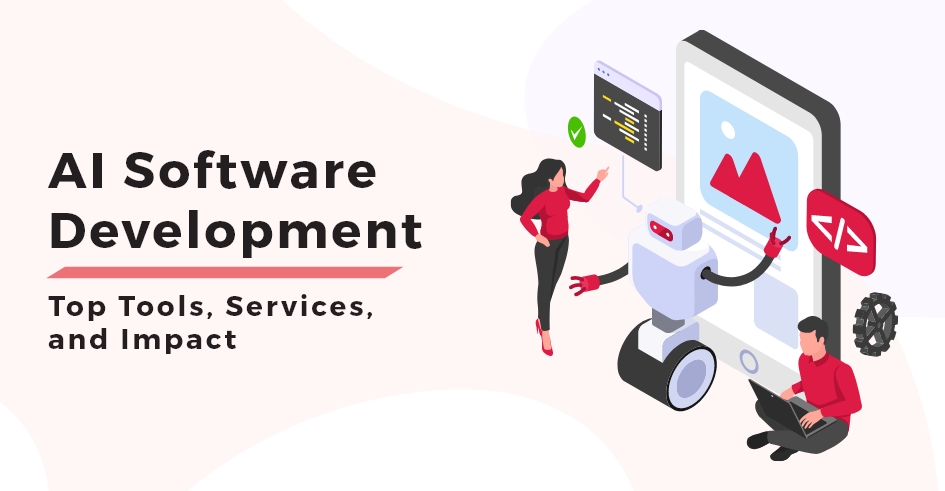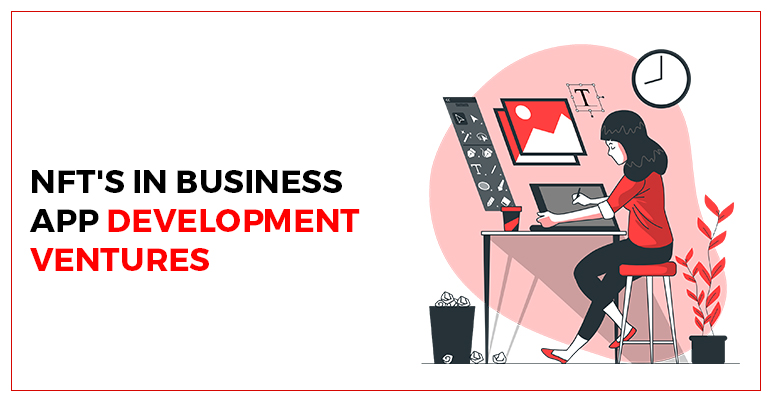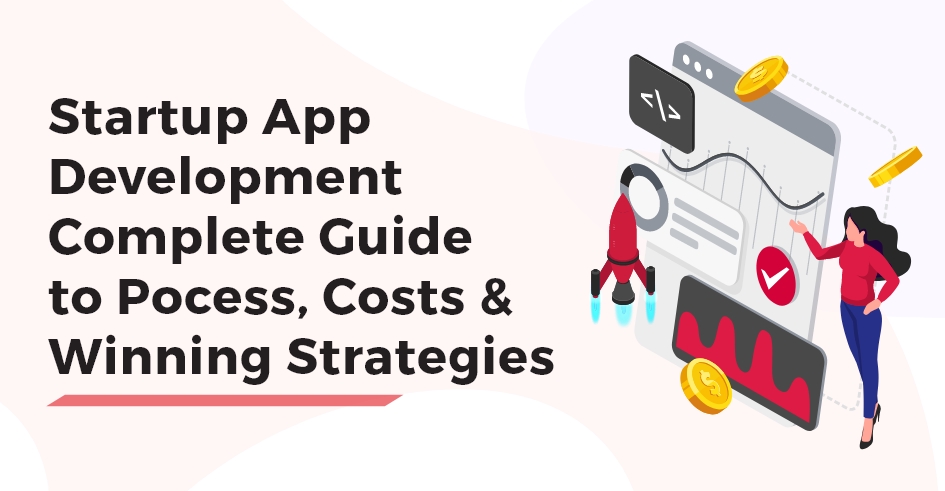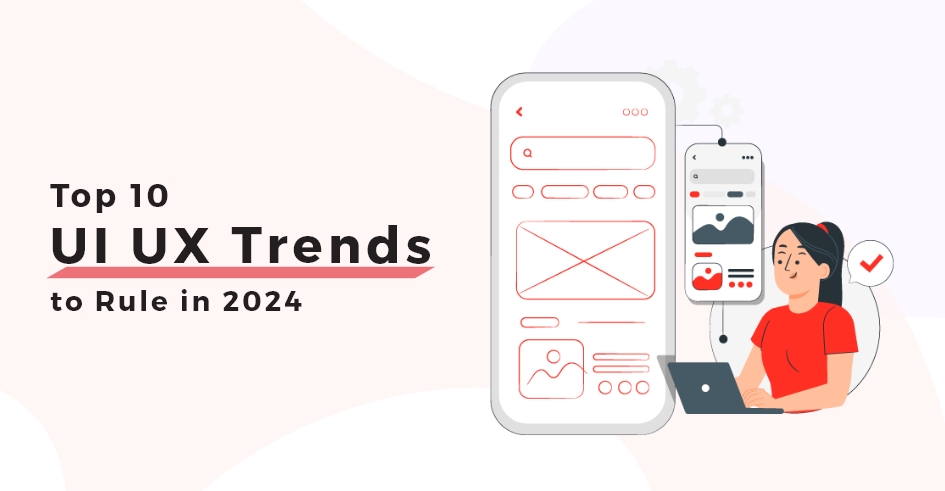AI Software development has always been about streamlining efficiency, improving quality, and reducing costs. Traditional methods struggle to keep up with today’s demands for rapid delivery and flawless execution.
Software developers for hire face the challenge of balancing speed with perfection. For AI software development companies the pressure to innovate while maintaining flawless code is overwhelming, and human error remains a persistent obstacle.
This is where AI software development takes the center stage. Based on the 2024 Stack Overflow Developer Survey, approximately 82 percent of developers stated that they are actively using AI tools to assist with coding. With cutting-edge tools and services, AI is revolutionizing custom software development, optimizing workflows, reducing coding errors, and automating complex tasks.
In this blog, we’ll explore the top AI tools, services, and their impact on software development in 2025.
What is AI?
Artificial Intelligence is the simulation of human intelligence in machines programmed to think, learn, and solve problems. In software development, Artificial Intelligence services can assist by automating repetitive tasks, analyzing vast datasets, and even generating code. AI has several subfields, such as:
- Machine Learning (ML): Teaches systems to learn from data patterns.
- Natural Language Processing (NLP): Enables machines to understand and interpret human language.
- Deep Learning: A subset of ML that uses neural networks to mimic human decision-making.
Let’s consider a hypothetical scenario in which a mobile app development company Dallas creates an app similar to Klover called “CashWise.”
- User Interaction: Users interact with CashWise through a chatbot powered by NLP, which helps them navigate the app and understand their options.
- Personalization: Using ML algorithms, CashWise learns from user interactions, tailoring financial advice and advance offers to meet individual needs.
- Risk Assessment: The app employs predictive analytics to determine whether users qualify for cash advances and how much they should receive, thereby reducing the chances of defaults.
- Verification Process: Users can securely verify their identity by uploading photos of their IDs, which the app processes using computer vision technology.
- Security Protocols: Finally, CashWise employs AI-driven security measures that monitor user activity for any unusual patterns, ensuring that the app remains a safe platform for financial transactions.
By incorporating these AI subfields into the app development process, a mobile app development company in Dallas can create innovative and effective financial solutions that resonate with users. When built with AI, apps like Klover not only improve user experience but also establish trust and security, which are essential in the financial sector.

What is AI Software Development?
AI software development is the process of building software applications that use artificial intelligence to solve problems. At TechnBrains, AI Software development has led us to speed up processes while ensuring higher application quality and security. Think of AI and software development as creating super-smart apps that can think, learn, and act on their own. AI-assisted software development doesn’t mean robots are taking over (yet), but it does mean apps are getting a lot smarter.
For example, when you open Netflix, it recommends shows based on what you’ve watched—that’s AI at work. Or you ever used Siri, Alexa, or Google Assistant? These tools learn your voice, habits, and preferences. That’s artificial intelligence improving your experience every time.
Here’s where AI software development gets exciting
- Speed: AI can help developers create apps much faster. It automates repetitive tasks like debugging, testing, and even generating code. Remember how Iron Man has J.A.R.V.I.S. helping him build the suit? AI tools work the same way for developers.
- Smarter Decisions: AI doesn’t just help you build; it learns from data. That means the more it works, the better it gets. Just like a chef who learns from every dish they make, AI improves its accuracy and performance over time.
- Fewer Mistakes: Humans are awesome, but let’s face it—we make mistakes. ai and software developmen on the other hand, can analyze huge amounts of data and spot issues in code that a human might overlook. It’s like having a superpower that helps you catch bugs before they cause problems.
Still with me?
Here’s a fun fact: The first AI program was created in the 1950s by a guy named Arthur Samuel. He taught a computer how to play checkers, and it eventually got better than he did! Fast-forward to today, and we have AI building everything from self-driving cars to recommendation engines that know our guilty pleasures (yes, I watched all the “Fast and Furious” movies—don’t judge!).
The Impact of AI Software Development
The impact of AI software development on the industry in 2025 is undeniable. From reducing manual coding efforts to enabling rapid prototyping and deployment, AI tools and services are transforming how companies develop software.
AI-driven software development has drastically shortened the development lifecycle, allowing companies to launch products faster and more efficiently. According to recent reports, businesses using AI software development have seen a 30% increase in productivity, thanks to tools like AutoKeras and Claude that streamline machine learning tasks. Custom software development companies can be at the top of the list by adopting AI software development services. (Like TechnBrains is!)
Furthermore, outsourcing software development strategically can enhance this transition, allowing companies to tap into specialized expertise and reduce costs. If you haven’t considered AI software development yet, the time is now. The competitive landscape is shifting, and businesses that don’t integrate AI risk becoming obsolete.
Benefits of Using AI Software Development
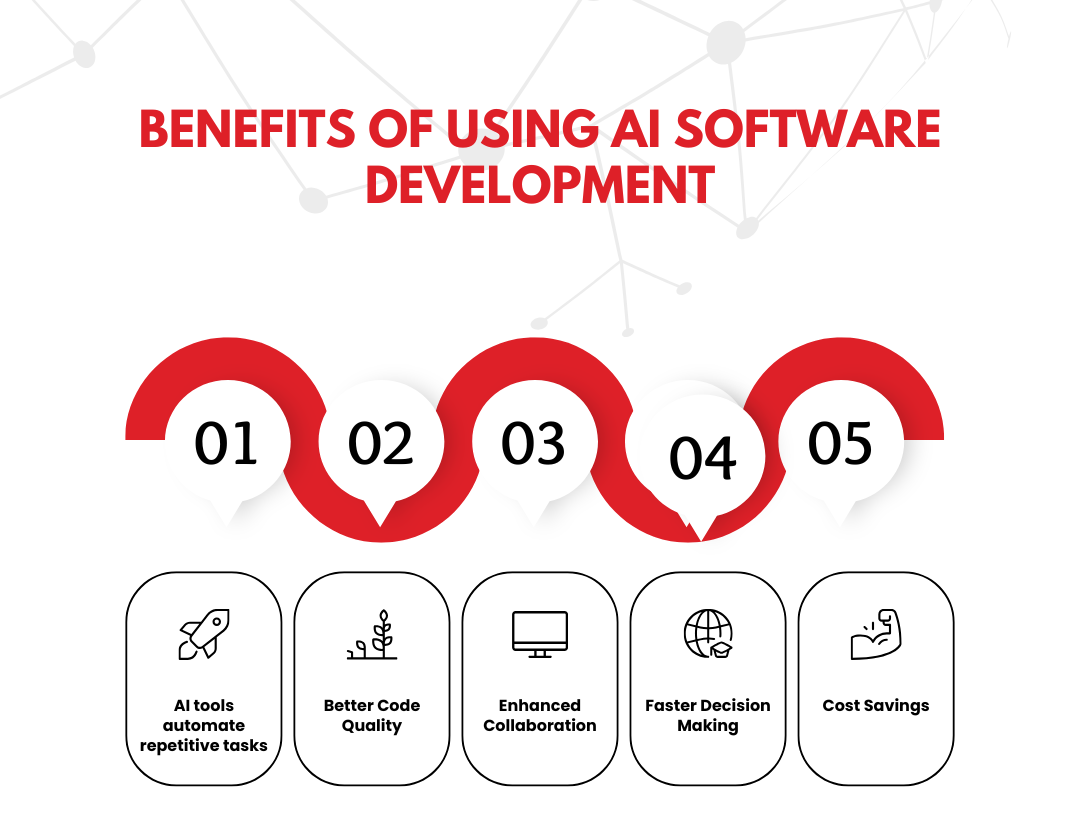
AI Software Development is cost-effective and helps you increase efficiency, improve code quality, enhance collaboration, and make faster decisions.
- AI tools automate repetitive tasks: This allows developers to focus on more complex problems. With less manual work, teams can deliver projects faster.
- Better Code Quality: Tools like DeepCode provide insights into your code. They suggest improvements, leading to higher quality and more maintainable code.
- Enhanced Collaboration: AI tools can facilitate better communication among team members. For example, using platforms like GitHub with integrated AI helps team members share and review code more effectively.
- Faster Decision Making: AI can analyze vast amounts of data quickly. This helps teams make informed decisions about design, features, and user experience.
- Cost Savings: By improving efficiency and code quality, AI tools can reduce development costs. Fewer bugs and faster testing mean lower expenses in the long run.
AI Tools for Software Development
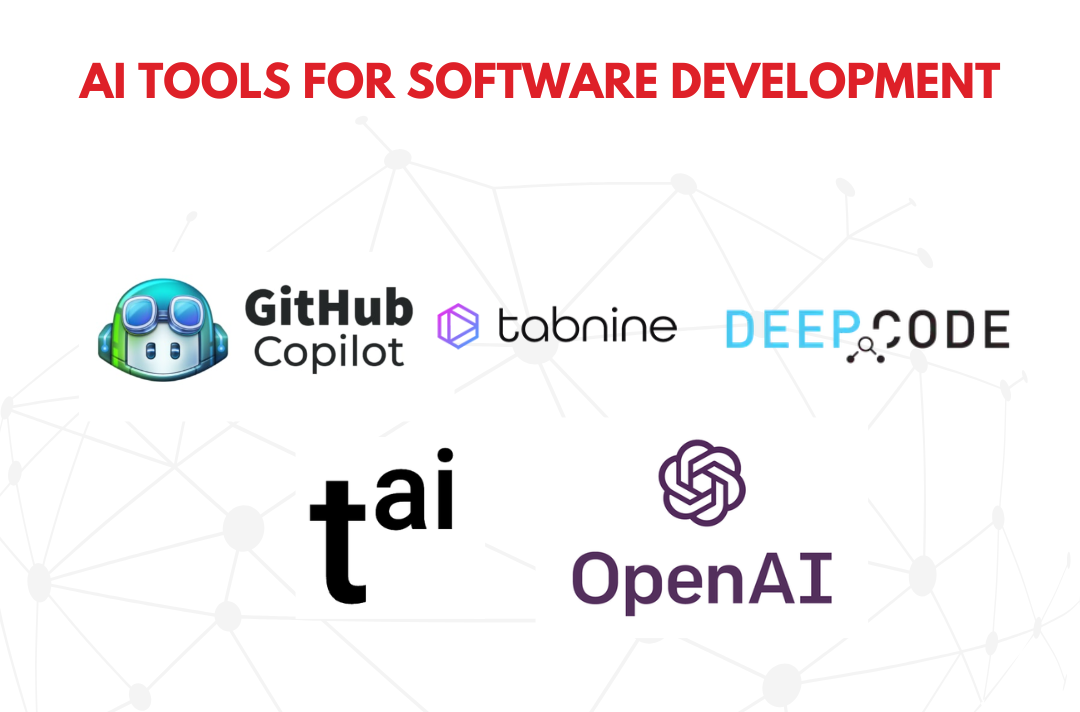
AI tools for software development are software applications that utilize artificial intelligence to assist developers. They help automate tasks, analyze data, and improve coding efficiency. AI tools can suggest code snippets as you type. This reduces the time spent on coding and minimizes errors. These tools can identify bugs and vulnerabilities in your code. Early detection helps prevent costly fixes later.
AI can automate testing processes, ensuring that your software works as expected without manual intervention. AI tools can analyze large datasets quickly. This is useful for making data-driven decisions during development.
Here are some popular AI software development tools that you might find useful:
GitHub Copilot
This tool acts like a coding assistant. It suggests code and functions based on the context of what you are writing. Developers report that it speeds up the coding process significantly.
Tabnine
Tabnine is an AI-powered code completion tool. It learns from your coding patterns and suggests completions to enhance your workflow.
DeepCode
This tool scans your code for potential issues. It provides suggestions to improve code quality and performance. DeepCode uses AI to learn from millions of codebases.
Test.ai
Automated testing is crucial for software development. Test.ai uses AI to create test cases and run them automatically, making the testing process faster and more reliable.
Codex by OpenAI
Codex is a powerful AI that understands and generates code. It can help in various programming languages, making it a versatile tool for developers.
AI Development Frameworks
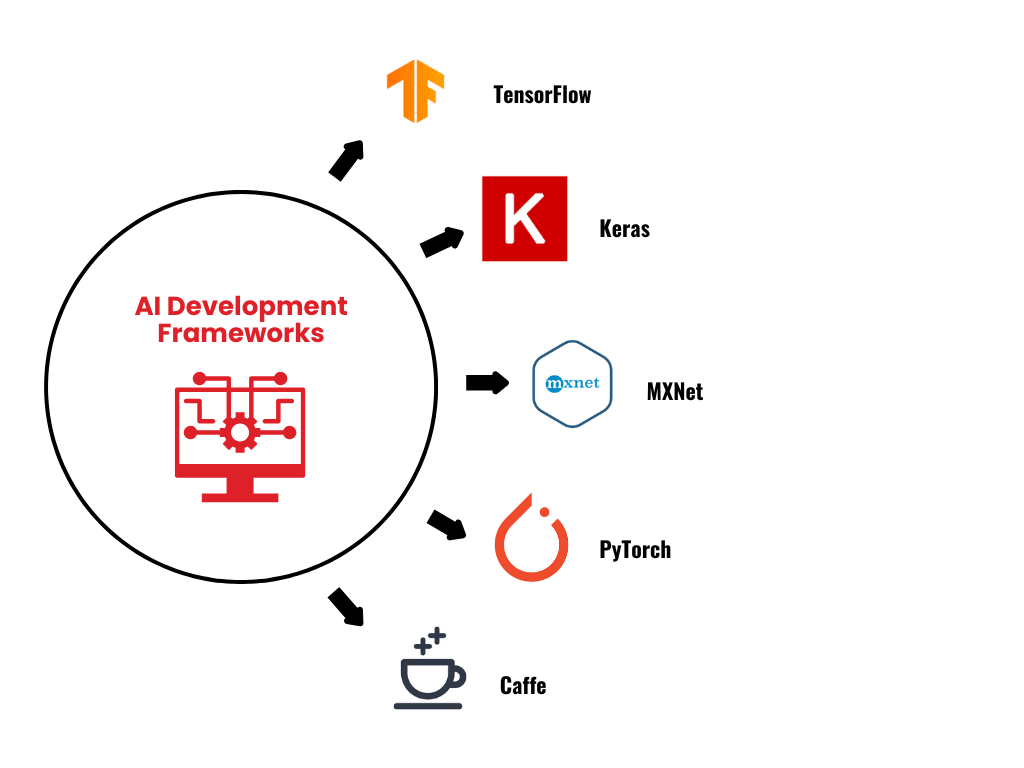
Creating intelligent AI applications requires more than just coding skills. You need the right framework to support your AI ambitions. A strong AI framework is like a well-built foundation for a house—it holds everything together and ensures stability.
Here are the top AI development frameworks leading the way in 2025:
1. TensorFlow
This heavyweight champion, developed by Google, offers support for everything from deep learning to complex neural networks. It’s versatile, powerful, and widely adopted by AI engineers and researchers.
2. Keras
If TensorFlow is Captain America, Keras is more like Spider-Man—agile, flexible, and easy to use. Built on top of TensorFlow, Keras simplifies the development of AI models without sacrificing functionality.
3. MXNet
Known for its performance and scalability, MXNet can run across multiple GPUs, making it ideal for deep learning tasks. It’s also used by companies like Amazon for building large-scale AI systems.
4. PyTorch
Loved by researchers and developers alike, PyTorch is praised for its flexibility and dynamic computational graph. It allows you to change your model on the go, which is great for research purposes.
5. Caffe
Caffe is a deep learning framework that’s known for its speed. It’s particularly useful for image classification tasks and has been widely adopted in the research community.
Top AI Tools 2025 Every Developer Should Use
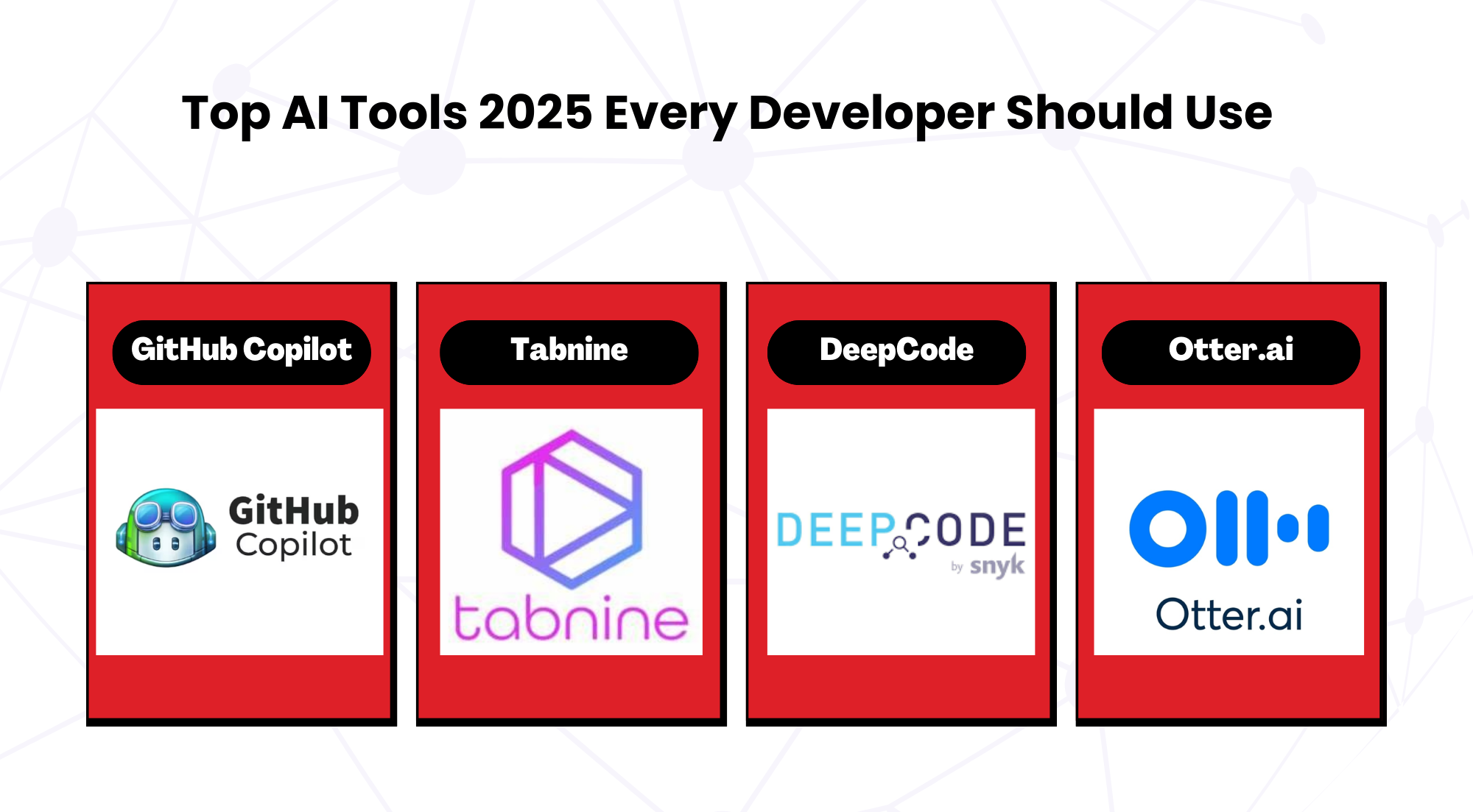
AI is changing the way developers work. By 2025, it will be almost impossible to write code without using some form of AI assistance. These tools are not just “nice-to-haves” anymore; they’re essential. Why? Because they help developers write cleaner code, save time, and avoid errors. Below are the top AI tools every developer should use by 2025:
1. GitHub Copilot
It’s like having a superpower! Copilot helps you write code faster by suggesting whole functions, fixing bugs, and even generating test cases. Think of it as your coding buddy. It learns from the code you write and anticipates what you’ll do next.
You’re writing a function to process data. Just as you’re about to start, Copilot suggests the whole function. Boom! You just saved 15 minutes.
2. TabNine
If you’ve ever wished for magic to write code for you, this is pretty close. It works across most IDEs and provides AI-driven suggestions as you type. Whether you’re writing JavaScript, Python, or Ruby, TabNine offers context-aware completions to help you stay in the flow.
3. DeepCode
No more late-night bug hunts! DeepCode uses AI to analyze your code and suggests security fixes, performance improvements, and best practices. It’s like having an experienced mentor who’s always watching your back.
4. Otter.ai
Otter.ai is an AI-powered meeting assistant that enhances productivity by transcribing conversations in real time. It differentiates speakers, making it easier to follow discussions in large meetings.
Otter automatically generates summaries, highlights key points, and identifies action items for assignment. You can search transcripts for specific keywords and playback recordings synchronized with the text. It also enables easy sharing of transcripts and recordings, keeping everyone aligned.
AI for Ethical Use and Bias Detection
Ethical concerns in AI are no longer just a side topic. They’re front and center in discussions about the future of technology. AI, as advanced as it is, can sometimes reflect biases in the data it’s trained on. That’s a huge problem, especially in areas like hiring or legal decisions where fairness is critical. How do we combat that? Thankfully, there are powerful tools to keep your AI in check.
Let’s dive into some of the best tools to detect and reduce bias in AI:
IBM AI Fairness 360
This toolkit does exactly what its name promises: it helps make AI fairer. It offers metrics to test for bias and algorithms to reduce it. For instance, if your model shows favoritism toward one group over another, AI Fairness 360 can highlight the issue and suggest ways to fix it.
Example: Imagine you’re building a loan approval model, and without realizing it, the model favors applicants from a particular zip code. AI Fairness 360 will catch this bias and suggest ways to re-balance the data. It’s like having a fairness referee for your AI!
Fairlearn
Python developers, this one’s for you. Fairlearn helps you assess your machine learning models’ fairness and tweak them for better results. It’s not just about detecting bias but offering options for improvement too. Remember in “The Matrix” when Neo learns to control the system? Fairlearn lets you do the same, only instead of dodging bullets, you’re dodging bias.
Google’s What-If Tool
This tool is fantastic for visualizing what might happen if your model changes. You can play out various scenarios and see if they lead to biased outcomes. It’s especially useful in complex decision-making models where biases can be subtle but harmful. It’s like having a crystal ball for your AI—you get to see the future consequences of your code and prevent any ethical disasters before they happen.
Aequitas
Aequitas is all about fairness audits. It checks how your models perform across different demographic groups and helps make sure the outcomes are balanced. If you’re working on public-facing software, this is your go-to tool for ensuring transparency. Think of Aequitas like a dietician for your AI. It examines everything to make sure your model is not just “healthy” but also ethical.
Themis-ml
This tool targets fairness directly in machine learning. Themis-ml tests your models for discrimination and includes techniques to correct any biases it finds. It’s like having an AI bias detective on your team. You can think of Themis-ml as Sherlock Holmes for AI. It searches through your data and models to uncover any wrongdoing, making sure justice is served.
AI Software Development in Business and Productivity
AI Software development has a profound impact on business productivity. Companies are increasingly adopting AI tools to streamline operations, reduce costs, and enhance efficiency. For instance, Grammarly aids in producing error-free content quickly, while SEO.ai automates search engine optimization.
Automation is a major advantage of AI. Tools like Canva AI enable rapid creation of marketing visuals, cutting creative task time in half. In content-heavy industries, Jasper automates text generation for blogs and social media.
AI is also revolutionizing data analysis. Tools like Tableau AI and Google Cloud AI help businesses uncover insights from large data sets, facilitating data-driven decisions. Furthermore, AI-driven chatbots and virtual assistants enhance customer service by managing inquiries and sales, freeing employees for strategic tasks.

Emerging AI Software Development Trends
Businesses need to capatlize on AI Software Development need to stay updated to maintain their competitive advantage. Here are some of the key emerging trends reshaping industries:
1. Edge AI
Edge AI refers to the use of AI technologies on devices located at the “edge” of the network—closer to where data is generated (such as IoT devices or mobile phones). This reduces the need for data to be sent to centralized cloud servers, cutting down on latency and improving real-time decision-making. For example, smart devices like self-driving cars and drones use Edge AI to process data locally, allowing them to make decisions quickly and efficiently.
2. Quantum AI
Quantum computing is another emerging trend in AI software development. This trend promises to revolutionize industries by solving problems that traditional computers cannot. Quantum AI uses quantum computing’s immense processing power to tackle complex optimization problems and enhance machine learning models. While still in its early stages, companies that invest in quantum AI are positioning themselves at the forefront of technological innovation.
3. Hyper-automation
This involves using AI to automate every aspect of business operations, from supply chain management to HR processes. By integrating AI with robotic process automation (RPA) and machine learning, businesses can create highly efficient, end-to-end automated workflows. Hyper-automation reduces human error, increases accuracy, and can significantly cut costs in industries like manufacturing, logistics, and finance.
4. AI in DevOps
In AI software development, AI is now integral to DevOps (Development and Operations). AI tools optimize various stages of the software development lifecycle, such as continuous integration, deployment, and monitoring. With AI-driven solutions, developers can benefit from predictive analytics that foresee potential issues before they occur, helping teams solve problems in real-time. For instance, AI can detect vulnerabilities or inefficiencies in code, allowing for quicker fixes and more reliable software releases.
5. Natural Language Processing (NLP)
NLP is becoming more sophisticated and widely used. Businesses are leveraging NLP for customer service automation, sentiment analysis, and even for automating content generation. For example, AI-powered chatbots using NLP can understand and respond to customer queries with near-human accuracy, improving customer experience while reducing the burden on human customer service teams.
Generative AI Tools in AI Software Development
Generative AI tools are systems powered by machine learning models designed to create content, from text to images and even videos, based on user inputs.
How Does This Help Businesses?
Generative AI tools are reshaping industries by enhancing productivity and saving time. Tools like GPT-5 automate writing tasks, freeing teams for creative strategies. Developers can use tools like GitHub Copilot to accelerate coding by receiving suggestions from AI.
AI software development tools like ChatGPT engage with customers, efficiently providing 24/7 support. MidJourney generates unique images, while Synthesia creates high-quality videos rapidly, reducing the need for production teams.
Generative AI not only saves time but also fosters business growth for AI software development. Tools like Synthesia cut production costs dramatically. AI accelerates content and product launches. By handling routine tasks, AI allows teams to focus on creative brainstorming. As generative AI tools evolve by 2025, their roles in software development will grow, requiring a balance of automation and human oversight to maintain creativity and quality.
The Future of AI Software Development
AI software development is the future for smart software development. The software development ai tools for 2025 are GitHub Copilot, Tabnine, DeepCode, Test.ai and Codex by OpenAI. These tools will help how developers work, enabling them to be more productive, efficient, and innovative. However, AI should be viewed as an assistant rather than a replacement—developers are still critical for innovation, problem-solving, and ensuring that AI solutions align with business needs.
Supercharge Your Business with AI Software Development at TechnBrains
At TechnBrains, we pride ourselves on being a leading AI software development company dedicated to delivering cutting-edge AI software development solutions tailored to meet your unique business needs. Our AI-assisted software development process enhances efficiency, improves code quality, and streamlines collaboration, ensuring you receive the best possible product.

AI Software Development Services
We offer AI Software Development Services to help you innovate with ease.At TechnBrains, we offer a variety of custom AI solutions tailored to enhance productivity and efficiency for businesses. Our machine learning development services create models that analyze data and automate decision-making processes. We specialize in natural language processing (NLP) to develop chatbots and virtual assistants that improve customer interactions.
Our AI-powered analytics solutions provide actionable insights from large datasets, while computer vision applications enable systems to interpret visual information, beneficial in sectors like security and healthcare. We also utilize AI-assisted software development tools to speed up coding, testing, and deployment.
Additionally, our predictive maintenance solutions help businesses anticipate equipment failures, and robotic process automation (RPA) streamlines repetitive tasks for better accuracy and efficiency. Our AI-driven testing services ensure high-quality code, and our AI consulting services guide businesses in effectively integrating AI technologies into their operations.
These services reflect TechnBrains’ commitment to being a leading AI software development company in the USA, offering comprehensive AI software development solutions to businesses looking to leverage the power of AI in their operations.


